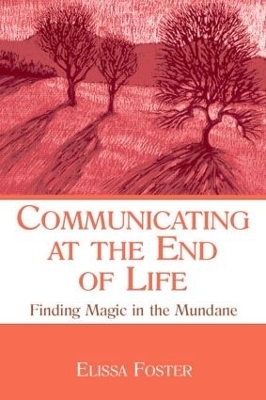
Communicating at the End of Life
Finding Magic in the Mundane
Seiten
2006
Routledge (Verlag)
978-0-8058-5566-1 (ISBN)
Routledge (Verlag)
978-0-8058-5566-1 (ISBN)
This enlightening volume provides first-hand perspectives and ethnographic research on communication at the end of life, a topic that has gone largely understudied in communication literature. Author Elissa Foster’s own experiences as a volunteer hospice caregiver form the basis of the book. Communicating at the End of Life recounts the stories of Foster and six other volunteers and their communicative experiences with dying patients, using communication theory and research findings to identify insights on the relationships they form throughout the process. What unfolds is a scholarly examination of a subject that is significant to every individual at some point in the life process.
Organized chronologically to follow the course of Foster’s involvement with hospice and the phases of the study, the book opens with Part 1, providing background and contextual information to help readers understand subsequent stories about communication between volunteers and patients. Part 2 of the volume emphasizes the adjustments required by the volunteers as they entered the world of hospice and the worlds of the patients. Part 3 underscores the importance of improvisation and finding balance within the role of volunteer—in particular how to be fully present for patients as well as their family members. The volume concludes with Part 4, which addresses how volunteers coped with the death of their patients and what they learned from the experience of volunteering.
Communicating at the End of Life is appropriate for scholars and advanced students studying personal relationships, health communication, gerontology, interpersonal communication, lifespan communication, and communication & aging. Its unique content offers precious and meaningful insights on the communication processes at a critical point in the life process.
Organized chronologically to follow the course of Foster’s involvement with hospice and the phases of the study, the book opens with Part 1, providing background and contextual information to help readers understand subsequent stories about communication between volunteers and patients. Part 2 of the volume emphasizes the adjustments required by the volunteers as they entered the world of hospice and the worlds of the patients. Part 3 underscores the importance of improvisation and finding balance within the role of volunteer—in particular how to be fully present for patients as well as their family members. The volume concludes with Part 4, which addresses how volunteers coped with the death of their patients and what they learned from the experience of volunteering.
Communicating at the End of Life is appropriate for scholars and advanced students studying personal relationships, health communication, gerontology, interpersonal communication, lifespan communication, and communication & aging. Its unique content offers precious and meaningful insights on the communication processes at a critical point in the life process.
Elissa Foster
Preface; Part 1 Hospice as a Context of Health Care and Interpersonal Communication; Chapter 1 Beginnings; Chapter 2 Volunteer Training; Part 2 Entering the Country of the Dying; Chapter 3 Taking the First Steps; Chapter 4 The Volunteers’ Stories; Chapter 5 Going Out; Part 3 Communication as Improvisation; Chapter 6 Living in the Moment Between Life and Death; Chapter 7 Caring Without Conversation; Chapter 8 Being Together, Letting Go; Part 4 Communication at the Time of Death; Chapter 9 Endings; Chapter 10 Volunteers’ Reflections on the First Year; Chapter 11 Hospice and Communication at the End of Life; appendix1 Appendix;
| Erscheint lt. Verlag | 30.11.2006 |
|---|---|
| Reihe/Serie | LEA's Series on Personal Relationships |
| Verlagsort | New York |
| Sprache | englisch |
| Maße | 152 x 229 mm |
| Gewicht | 640 g |
| Themenwelt | Medizin / Pharmazie ► Pflege ► Palliativpflege / Sterbebegleitung |
| Studium ► Querschnittsbereiche ► Prävention / Gesundheitsförderung | |
| Sozialwissenschaften ► Kommunikation / Medien ► Kommunikationswissenschaft | |
| ISBN-10 | 0-8058-5566-1 / 0805855661 |
| ISBN-13 | 978-0-8058-5566-1 / 9780805855661 |
| Zustand | Neuware |
| Haben Sie eine Frage zum Produkt? |
Mehr entdecken
aus dem Bereich
aus dem Bereich
das Manual zur psychologischen Gesundheitsförderung
Buch | Hardcover (2023)
Springer Berlin (Verlag)
CHF 55,95
Orthomolekulare Medizin in Prävention, Diagnostik und Therapie
Buch | Hardcover (2022)
Thieme (Verlag)
CHF 81,80


